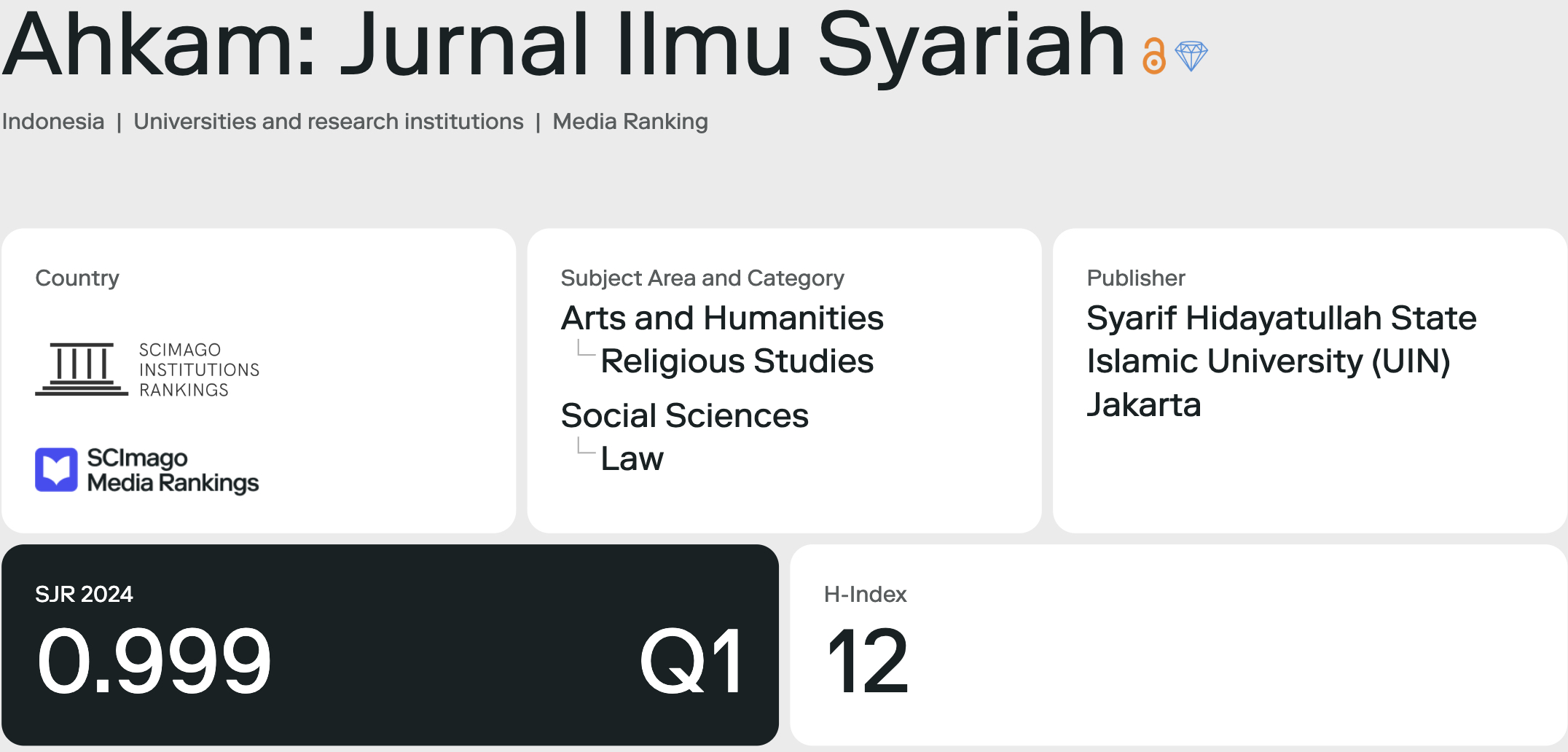Sharia and Politics in The Context of Globalization and Society 5.0
DOI:
https://doi.org/10.15408/ajis.v22i2.28959Abstract
This article aims to describe and analyze globalization and its impact on Islamic politics and Islamic law (sharia) in the modern era. Globalization has brought about a new set of ethics and norms in human relations which in some ways have led to changes in worldviews as well as social, economic, and political systems in the world. Most Muslim scholars accept it, including the influence of Western civilization, with certain adjustments that refer to Islamic teachings and national identity. In most Muslim countries, globalization has affected changes in state systems, such as nation-state, democracy, and protection of human rights. In addition, globalization has affected the status of Islamic law, especially in the form of secularization of national law, although this was later revised with efforts of Islamization of national law. Globalization also has an impact on the need to reinterpret several provisions of Islamic law that are not in line with modern perspectives and challenges, especially provisions related to society 5.0, such as legitimizing digital transactions, peaceful relations between Muslims and non-Muslims, and the understanding of defensive jihad.
Keywords: globalization; Islamic politics; Islamic law
Abstrak
Artikel ini bertujuan untuk mendeskripsikan dan menganalisis globalisasi dan dampaknya terhadap politik Islam dan hukum Islam (syariah) di era modern. Globalisasi telah membawa seperangkat etika dan norma baru dalam hubungan manusia yang dalam beberapa hal menyebabkan perubahan pandangan dunia serta sistem sosial, ekonomi, dan politik di dunia. Sebagian besar ulama dan intelektual Muslim menerimanya, termasuk pengaruh peradaban Barat, dengan penyesuaian tertentu yang mengacu pada ajaran Islam dan identitas bangsa. Di sebagian besar negara Muslim, globalisasi telah mempengaruhi perubahan sistem negara, seperti nation-state, demokrasi, dan perlindungan hak asasi manusia. Selain itu, globalisasi telah mempengaruhi status hukum Islam, terutama dalam bentuk sekularisasi hukum nasional, meskipun kemudian direvisi dengan upaya Islamisasi hukum nasional. Globalisasi juga berdampak pada kebutuhan untuk menafsirkan kembali beberapa ketentuan hukum Islam yang tidak sejalan dengan perspektif dan tantangan modern, terutama ketentuan yang terkait dengan masyarakat 5.0, seperti legitimasi transaksi digital, hubungan damai antara Muslim dan non- Muslim, dan pemahaman tentang jihad defensif.
Kata Kunci: globalisasi; politik Islam; hukum Islam
References
Aba-Namay, R. (1993). The Recent Constitutional Reforms in Saudi Arabia. The International and Comparative Law Quarterly, 42(2), 295–331.
Al-Dhib, J.‘A.M. (n.d.). Ḥukm al-Tijārah al-Illiktrūniyyah fî al-Sharī‘ah al- Islāmiyyah. https://iasj.net/iasj/download/b941c19ba115743d.
Al-Marāghī, A. M. (1946). Tafsīr al-Marāghī juz’ 10. Mustafā al-Bab al-Halabī.
Al-Qarādawī, Y. (1997). Min Fiqh al-Dawlah fī al-Islām. Dār al-Sharūq.
Al-Qarādawī, Y. (2009). Fiqh al-Jihād. Maktabah Wahbah.
Alwan, C. ’Amar A. N. (n.d.). al-‘Aulamah fî al- Qur‘ān al-Karīm.Apter, D. A. (1977). Introduction to Political Analysis. Cambridge and Massachusetts.
Apter, D. A. (1977). Introduction to Political Analysis. Cambridge and Massachusetts. Winthrop Publisher.
Bassam, T. (1993). Die Fundamentalische Herausfordwerung: Der Islam und die weltpolitik. C.H. Beck.
Esposito, J. (1995). The Oxford Encyclopedia of the Modern Islamic World. Oxford University Press.
Esposito, J. L. (2004). Esposito, John L. n.d. "Practice and Theory: A Response to Islam and the Challenge of Democracy. BBC News.
Esposito, J. L., & Voll, J. O. (2021). Islam and Democracy. Humanities, 22(6).
Fox, J., & Sandler, S. (2005). Separation of Religion and State in the Twenty- First Century: Comparing the Middle East and Western Democracies. Comparative Politics, 37(3), 317–335.
Gidden, A. (1990). Consequences of Modernity. Stanford University Press. https://dictionary.cambridge.org/dictionary/english/electronic-transaction. (n.d.). https://www.britannica.com/topic/nation-state. (n.d.). https://www.Britannica.Com/Topic/Nation-
State.Huntington, S. P. (1996). The Clash of Civilizations and the Remaking of World Order. Simon and Schuster.
Kepel, G. (1996). Jihad: The Trail of Political Islam. Harvard University Press.
Krieger, Cf. J. (1993). The Oxford Companion to Politics of the World. Oxford University Press.
Lambton, S. A. K. S. (1991). State and Government in Medieval Islam. Macmillan Press.
Mahmood, T. (1987). Personal Law in Islamic Countries. Academy of Law and Religion.
Marks, M. (2017). Tunisia’s Islamists and the “Turkish Model.” Journal of Democracy, 28(1), 102–115. https://doi.org/10.1353/jod.2017.0009.
Maududi, A. (1960). Islamic Law and Constitution. Islamic Publication Ltd.
Mayer, A.E. (1995). Modern Legal Reform. In Oxford Encyclopedia of the Modern Islamic World (Vol. 2, p. 471).
Mazrui, A. A. (1998). Globalization, Islam, and the West. American Journal of Islam and Society, 15(3), 1–13. https://doi.org/10.35632/ajis.v15i3.2171.
Mitchell, R. P. (1993). The Society of Muslim Brothers. New York and Oxford: University Press. University Press.
Moten, A. R. (1996). Political Science: An Islamic Perspective. Macmillan Press.
Najjar, F. (2005). The Arabs, Islam and Globalization. Middle East Policy, 12(3), 91–106. https://doi.org/10.1111/j.1061-1924.2005.00215.x
Perry, G. E. (2003). Popular Sovereignty, Islam, and Democracy. American Journal of Islam and Society, 20(3–4), 125–139. https://doi.org/10.35632/ajis.v20i3-4.527
Pulungan, Cf. S. (1994). Fiqh Siyasah: Ajaran, Sejarah dan Pemikiran. Raja Grafindo.
Quṭb, S. (1979). Ma‘ālim fī al-Ṭarīq. : Dar al-Shurūq.
Ṣāliḥ, H. (1988). al-Dimuqrattiyah wa Ḥukm al-Islām Fīhā. Dar al-Nahda al-Islāmiyyah.
Shahid, M., Khaliq, A., & Mohtesham, M. M. J. (2021). An Innovative Fintech Model for the Enhancement of Akhuwat Microfinance Practices. Al-Iqtishad: Jurnal Ilmu Ekonomi Syariah, 13(2).
Stepan, A. (2012). Tunisia’s Transition and the Twin Tolerations. Journal of Democracy , 23(2), 89–103.
UNDP. (1993). The Human Development Report. Oxford Press University.
Weller, R. C. and M. E. A. (2021). Reason, Revelation and Law in Islamic and Western Theory and History (R. Charles Weller and Anver M. Emon, Ed.). Palgrave Macmillan.
Zakaria, F. (2004). Islam, Democracy, and Constitutional Liberalism. Political Science Quarterly, 1–20.








